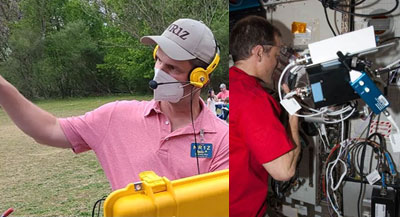Inspiring students through volunteer work
January 17, 2022

Technology can make communication seem effortless, but those connections don’t just happen, said online doctoral student Tony Rizi.
To help young students learn about the technology behind communications, he and fellow members of the Amateur Radio Club of Columbia County (ARCCC) have been holding outreach sessions at the Savannah River Academy, a preschool through 8th-grade non-sectarian private school in Grovetown, GA.
“It is important for students to understand that communications do not happen by magic,” he stated. “Antennas need to be a specific length, and someone needs to build the electronics.”
Over several months, kindergarten – 6th-grade students at the school have been exploring technology. They practiced Morse code, learned ham radio fundamentals, and even launched a weather balloon with a radio system that allowed them to track the balloon’s path.
These events were strategically planned to lead up to one big communication event – a talk with an astronaut on the International Space Station (ISS). ARCCC coordinated with the Amateur Radio International Space Station (ARISS) and NASA to develop and implement these learning experiences to prepare the students for the December 10 event. ARISS is the group that puts together special amateur radio contacts between students around the globe and crew members with ham radio licenses on the ISS.
The Augusta Chronicle posted a video from their event, and science teacher Dr. Nasiba White commented that as the students learned about space, their questions got more technical. “I could really see the progression” as students gained more knowledge, she said.
Rizi said the lessons allowed students to see the reality of technology and get hands-on experience. “It helps make it more concrete for them and can inspire them,” said Rizi. “Hopefully we’ll get some future astronauts out of the group.”
To communicate with ISS, which Rizi helped facilitate, they used two-way Frequency Modulated (FM) voice signal links between earth and the ISS, and a specialized antenna from the North Fulton Amateur Radio League that could track the space station from horizon to horizon by making direct contact with the amateur radio station aboard the space station.
During the 10-minute event, ten students asked astronaut Dr. Thomas Marshburn questions such as “How are AR and VR (augmented reality, virtual reality) technologies utilized for astronaut training in or on the ISS?” and “Are cyberattacks of concern aboard the ISS?”
Rizi is a retired Senior Chief Petty Officer who now works for the Department of Defense. He has a bachelor’s degree from Excelsior College and a master’s degree in cyber security from the University of Maryland – University College in cyber security. While he was in the Navy, he worked with various forms of communications from morse code to cyber operations. He is now working on his Ph.D. in Cyber Operations at DSU.
“The courses are interesting and challenging, and thought-provoking,” said the South Carolina native. In addition, fellow students in the program provide different perspectives on cyber operations topics, he noted.
“I want to be a recognized professional as an industry expert, and I think DSU is a great way to do that.”
